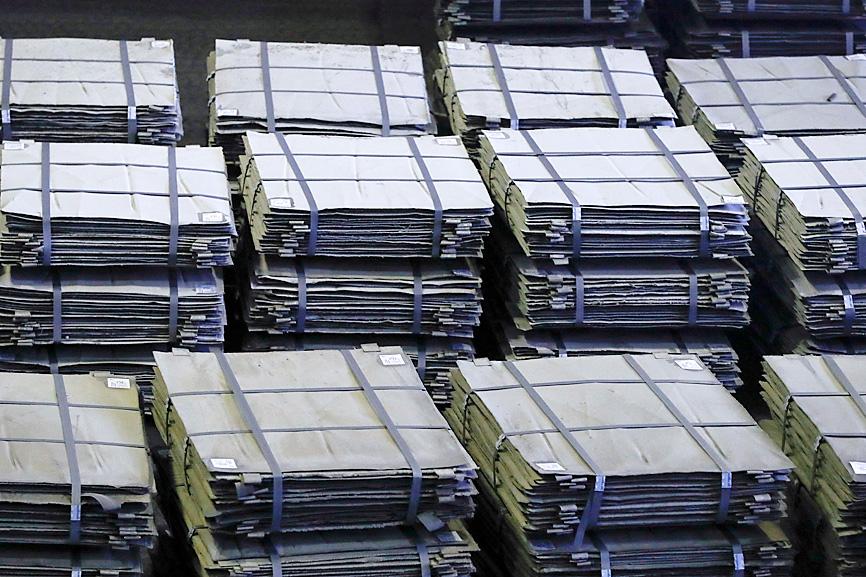Trading in nickel resumed yesterday on the London Metal Exchange (LME) after a lengthy pause linked to the Ukraine crisis, but was quickly suspended again after a sharp fall.
Nickel stopped trading having swiftly breached a new 5 percent daily price movement limit to stand at US$43,995 per tonne on the LME.
“Following reopen, the market moved to its limit-down pricing band,” the exchange said in a statement. “We have now halted the electronic market to investigate a potential issue with the limit-down band, and will update the market in due course.”

Photo: Reuters
Nickel, used in stainless steel and electric-vehicle batteries, spiked on Tuesday last week to a then-record high of US$101,365 per tonne on a bad bet from a Chinese billionaire after Russia’s invasion of Ukraine.
However, the LME subsequently decided to cancel all trades made that day and halted trading.
That leaves nickel’s record high at US$48,002 per tonne, set on Monday last week.
Moscow’s invasion sparked market chaos last week owing to supply concerns in Russia, the world’s third-biggest nickel producer.
The metal’s price, already soaring, was catapulted even higher by a bad pricing call from Chinese billionaire Xiang Guangda (項光達).
Xiang — owner of the world’s biggest nickel producer Tsingshan Holding Group Co (青山控股) — had bet on nickel prices falling since late last year, but was blindsided by the Ukraine war.
A short squeeze occurs when investors bet on falling prices, but are then forced to close out their positions and purchase at a far higher price, triggering a spike.

Taiwan Semiconductor Manufacturing Co (TSMC, 台積電), the world’s biggest contract chipmaker, booked its first-ever profit from its Arizona subsidiary in the first half of this year, four years after operations began, a company financial statement showed. Wholly owned by TSMC, the Arizona unit contributed NT$4.52 billion (US$150.1 million) in net profit, compared with a loss of NT$4.34 billion a year earlier, the statement showed. The company attributed the turnaround to strong market demand and high factory utilization. The Arizona unit counts Apple Inc, Nvidia Corp and Advanced Micro Devices Inc among its major customers. The firm’s first fab in Arizona began high-volume production

VOTE OF CONFIDENCE: The Japanese company is adding Intel to an investment portfolio that includes artificial intelligence linchpins Nvidia Corp and TSMC Softbank Group Corp agreed to buy US$2 billion of Intel Corp stock, a surprise deal to shore up a struggling US name while boosting its own chip ambitions. The Japanese company, which is adding Intel to an investment portfolio that includes artificial intelligence (AI) linchpins Nvidia Corp and Taiwan Semiconductor Manufacturing Co (TSMC, 台積電), is to pay US$23 a share — a small discount to Intel’s last close. Shares of the US chipmaker, which would issue new stock to Softbank, surged more than 5 percent in after-hours trading. Softbank’s stock fell as much as 5.4 percent on Tuesday in Tokyo, its

COLLABORATION: Softbank would supply manufacturing gear to the factory, and a joint venture would make AI data center equipment, Young Liu said Hon Hai Precision Industry Co (鴻海精密) would operate a US factory owned by Softbank Group Corp, setting up what is in the running to be the first manufacturing site in the Japanese company’s US$500 billion Stargate venture with OpenAI and Oracle Corp. Softbank is acquiring Hon Hai’s electric-vehicle plant in Ohio, but the Taiwanese company would continue to run the complex after turning it into an artificial intelligence (AI) server production plant, Hon Hai chairman Young Liu (劉揚偉) said yesterday. Softbank would supply manufacturing gear to the factory, and a joint venture between the two companies would make AI data

DOLLAR SIGNS: The central bank rejected claims that the NT dollar had appreciated 10 percentage points more than the yen or the won against the greenback The New Taiwan dollar yesterday fell for a sixth day to its weakest level in three months, driven by equity-related outflows and reactions to an economics official’s exchange rate remarks. The NT dollar slid NT$0.197, or 0.65 percent, to close at NT$30.505 per US dollar, central bank data showed. The local currency has depreciated 1.97 percent so far this month, ranking as the weakest performer among Asian currencies. Dealers attributed the retreat to foreign investors wiring capital gains and dividends abroad after taking profit in local shares. They also pointed to reports that Washington might consider taking equity stakes in chipmakers, including Taiwan Semiconductor